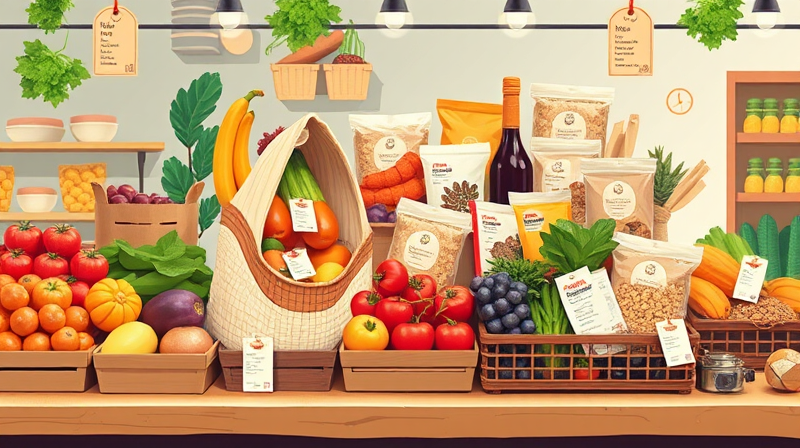Grocery shopping in today’s economy requires not just an understanding of food prices, but a careful approach to managing your food budget. With rising prices and an ever-changing market, this guide provides you with practical and inspiring strategies to navigate the supermarket aisles without stretching your finances too thin.
Planning ahead is the cornerstone of budget-friendly grocery shopping. It may seem tedious, but taking the time to craft a meal plan and check your inventory will pay off in the long run. Knowing exactly what you need avoids unnecessary purchases, reduces food waste, and unlocks a new perspective in managing your domestic finances.
Effective Strategies to Save Money
Meal planning is one of the simplest yet most effective methods for saving money. By planning your meals for the coming week, you ensure that every item on your shopping list has a purpose. An organized approach means that you only buy what you need, dramatically reducing the possibility of impulse buys. Many tools are available from smartphone apps to good old-fashioned handwritten lists, yet the key is consistency and commitment.
Before you even step into the store, an inventory check in your pantry, refrigerator, and freezer is essential. It is common to forget that you already have ingredients that can be used to whip up a delightful dinner. Knowing what you have on hand can inspire creative meal ideas and save you from double-purchasing the same items.
When you finally sit down to make that list, ensure every potential meal is considered. A detailed grocery list keeps you laser-focused on your shopping needs. It is in this moment of precision that you empower yourself to spend less while enjoying high-quality, nutritious food.
Smart shopping encompasses several tactics. One of the most valuable is buying in bulk, but with a warning: buy only those essentials that will not perish quickly. Items such as rice, pasta, canned goods, and dry beans are great candidates for bulk buying. Many bulk items are offered at lower prices compared to their individually packaged counterparts, which means more savings over time.
Along with bulk purchasing, embracing store brands is another strategic move. While it is easy to rely on well-known brands, generic alternatives often offer the same quality at 20-30% less cost. Making the switch to store brands can fortify your budget and provide a pleasant surprise in quality.
Buying produce seasonally and locally further enhances your capacity to economize. Local farmers’ markets and seasonal availability usually correlate with lower costs and increased flavor. Seasonal fruits and vegetables not only contribute to a healthier diet but also reduce the pressure on your wallet during off-peak times.
In today’s digital age, technology plays a critical role in enhancing your shopping experience. Using money-saving apps can lead to significant differences over the course of a year. Many of these apps offer coupons, cashback, and price comparison tools that allow you to take advantage of every discount opportunity available. Integrating digital coupons and loyalty programs from your favorite stores can be the icing on the cake of effective grocery shopping.
- Coupon Apps: Use these to browse deals before heading out.
- Cashback Apps: Earn small amounts back which add up over time.
- Price Comparison Tools: Check out these tools to see who offers the lowest price.
Choosing the right protein sources is also vital. Often, more affordable proteins include marked-down meat during morning hours, eggs, beans, legumes, and ground turkey which can be a cheaper alternative to beef. These choices allow you to maintain a balanced diet while managing your food costs effectively.
Another strategy to consider is opting for frozen or canned produce instead of strictly fresh options. Frozen fruits and vegetables can reduce cost due to longer shelf lives and typically lower prices when out-of-season. Likewise, canned foods such as tomatoes, beets, or even certain vegetables, can be used in many recipes without a sacrifice in taste or nutritional value.
A shift in perspective about pre-prepped versus whole foods is necessary for sustained savings. Whole vegetables, like a bag of carrots, and block cheese as opposed to pre-shredded options can have significant cost benefits. This simple approach enhances both cooking creativity and dietary nourishment.
Additional savings can be realized by exploring different stores. Often, pricing may vary dramatically between locations, meaning that knowing which retailer excels in affordability for specific items can cut your grocery bill noticeably. This might require a little traveling, but the cumulative savings become substantial over time.
Family involvement amplifies the effectiveness of your grocery regimen. When every family member is engaged in the process—be it for meal planning, finding digital discounts, or sticking to the plan—the collective effort can yield remarkable results. A shared commitment to frugal grocery shopping transforms it from a chore into a team-building activity.
Lastly, accumulating spare change from every grocery visit can turn a series of trivial amounts into a notable saving reserve. Consider designating a jar solely for this purpose. Over time, even the smallest change can add up to a significant financial cushion.
Implementing these strategies is a journey that unfolds with consistency and discipline. Small changes in your shopping habits today can lead to impressive savings and a more mindful relationship with your food budget tomorrow. Embrace these techniques, and you will be well on your way to mastering budget-friendly grocery shopping without sacrificing the quality or nutritional value of your meals.
Remember, the power of planning, smart choices, and technology lies in their ability to transform even the most routine shopping trips into a financial success story. Every dollar saved is a step towards an empowered, budget-conscious lifestyle. Let your grocery shopping experience be a testament to the ingenuity and resilience of your commitment to savings.
Happy shopping—may your trips to the grocery store be filled with smart decisions, delicious meals, and a renewed sense of financial independence!








